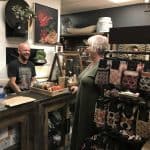When I talked to regular everyday tourism professionals and volunteers and business people at the Nebraska travel conference about social media, several said this was the best piece of advice I gave them:
Talk less about you, and more about them.
It’s hardly revolutionary. You’ve probably heard it before. You might even have said it to someone else, but have you looked at your own communications? And not just social media. Look at your print communication, and even what your people say to customers in person and on the phone. Have you looked at your invoices lately? Are they more about you, or more about them?
A friend who does communication for a small firm in Oklahoma told me he had hit something of a wall with social media. We talked for a moment, and he asked how to get more people to read his company blog. I looked at the recent posts, and I asked him bluntly, “Why would they? It’s all about what you think is important. There isn’t anything on there for them.”
He understood immediately. He changed their entire social strategy. Now he subscribes to several publications that carry stories his customers would care about for their businesses. He monitors Google Alerts for industry terms, for his customers’ industry. He shares the best stories on Twitter, in videos, and in posts on their blog. I encouraged him to also print them on paper, for his not-so-online customers, and to include them with weekly invoices.
So you see, even an invoice can be more about them than about you. Now go look at everything you send or say to customers, and give it the same makeover.
Two specific ways to talk more about them, less about you.
1. Answer their questions.
Listen for and write down every question a customer asks you (or your front line people) in person, by phone, or by email. Write up the answers and publish them on your blog. No other tool is as useful for this as a blog on your home website. If you have other social network presences like LinkedIn, Facebook or Twitter, those are good places to share the short versions of the questions and link back to the answers.
Don’t have many customers, or think you don’t get questions? Head out to a professional Q and A site like LinkedIn Answers or Quora. Search for keywords related to your business or service. Pay attention to the questions. Draw out themes or common questions and write your own answers back on your blog.
2. Be a social media mirror.
Our friend Mark Harbeke used that phrase to describe how his organization could be more useful for their customers. They help small employers to find best practices in how they treat their employees and to implement them. He realized they should be telling more stories of their customers who were doing good things, by reflecting their peers’ stories back to the community.
Jason Falls told me about a small business that does adventure trips. They have a simple online form asking customers to share the story of their adventure and allowing them to upload photos. The stories and photos feed into the company blog, as draft blog posts. An employee then checks over the stories and publishes them. It’s a beautiful system for being a social media mirror.
Share your customers own photos and stories. Let them speak in their own words, their own voice, when possible.
New to SmallBizSurvival.com? Take the Guided Tour. Like what you see? Get our updates.
- About the Author
- Latest by this Author
Becky started Small Biz Survival in 2006 to share rural business and community building stories and ideas with other small town business people. She and her husband have a small cattle ranch and are lifelong entrepreneurs. Becky is an international speaker on small business and rural topics.












Becky –
It is a lesson I learn every day more and more and that after only 50,000 tweets – So far it’s “progress, not perfection” but I do have a growing interest in absolutely everything absolutely everybody out there is doing and tweeting – This post gets highest marks in the #Useful category –
Thank you.
You do great work.
Wayne
Wayne, while I meant this for business and marketers, it also applies to all of us. And your natural curiosity serves you well!
I love the idea of being a “social mirror”. Engaging our customers, clients and readers is vital to our success.